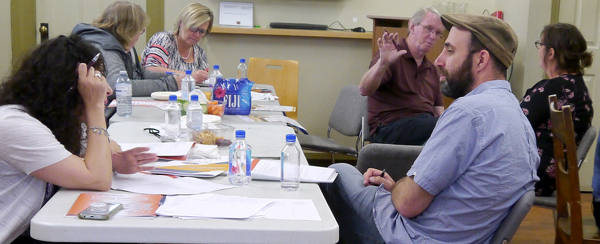Impact of poverty extends beyond money
Administrator | May 24, 2018 | Comments 0

Story and photo by Sharon Harrison
Representatives from local community organizations came together this week to talk poverty.
“The purpose is to engage people with lived experience in poverty, and poverty reduction, and showing that dignity is always an important part of the way we are working,” said Christine Durant, director, Poverty Roundtable Hastings Prince Edward.
The roundtable assembled those who know about, and work closely with, local groups, organizations and individuals for a discussion about making poverty a part of the conversation.
The workshop ‘Creating Community–A Tool for Engagement’ held at the Picton branch library was led by Durant with assistance from Tanya Montebello, Social Work Placement Student from the University of Waterloo.
The Prince Edward Learning Centre, the County Foundation, Community Living Prince Edward and the Hub Child and Family Centre were among those represented at the roundtable. Attendees were divided into small groups to brainstorm ideas – from who needs to be included in the decision making, to peer support and inclusivity.
“It’s about being an advocate; people sharing their personal stories and the importance of engaging with people with lived experiences and programs in the decision making,” said Durant. “Everyone here today has a background, so it’s about learning from each other.”
“The tools are about value and experience and how can we deal with that in a really meaningful way and it’s an opportunity to think about the work you are doing and the work you want to do and to think about what could be possible,” she said.
“There is a strong importance on dignity and being valued, of experiencing poverty as crisis and as trauma, of the need for a right approach and the need for urgency and the importance of being included in decision making,” said Durant. “Often going into poverty means giving up choice, giving up control of your life.”
Susan Quaiff, executive director of the Hub Child and Family Centre sees struggles in Prince Edward County with some of the centre’s young families and children, and others in the community.
“It’s always top of mind to decrease the effect of poverty in some of the families we see,” she said. “There is still a lot of stigma attached with accessing the services without judgement, or feeling that something will happen to me because I did that. So people are afraid to let their vulnerabilities be known.”
Brian Beiles, of The County Foundation said, “What we really want to build on significantly is the ability, and to create the ability in others, to engage people experience around poverty as key elements around food insecurity. We are also heading up a group around learning and dealing with kids dropping out of school and things of that nature.
“The whole thing around creating community and the tools associated with that are of significant interest. About creating better outcomes for youth in the community and about doing things for youth.”
Compared with other Ontario communities, poverty is the reality for many in Hastings and Prince Edward counties. The percentage of low-income households in Prince Edward County is 13.5 per cent. More than 30 per cent of single parents in Hastings Prince Edward are living in poverty and 10 per cent suffer from food insecurity.
“It’s about making the community aware that it’s not a small issue – it’s a large issue,” said one participant.
Also discussed were tools helpful to community groups, the sharing of those tools; learning from each other and working together on issues.
The workshop’s three main topics – Relationships (the building of), Barriers (the removing of obstacles) and Community (building community) – were addressed with rich conversation and detailed brainstorming sessions.
“Our work is about relationships and it’s such an integral part of what it is we do particularly in terms of purportedly taking a leadership role that nobody has necessarily given us to us,” said Beiles. “It’s about how do we gain trust, how do we gain respect and so on, is pretty key because we don’t have a mandate.”
The importance of building relationships with community and with individuals as clients was highlighted together with the value of, and building empowerment and peer-to-peer matches.
“It’s about helping them [individuals] come up with solutions as opposed to imposing what we think would be the solution to the issue,” said Quaiff.
Montebello spoke to the importance of connecting with other organizations and resource sharing.
“Some of the organizations offer so many wonderful things, but a lot of the time they aren’t familiar with each other,” she said.
“How do we build relationships with each other and the community?” asked Durant as she spoke about bridge building within the community.
Finding out what people want, as opposed to what they need, was also part of the discussion.
“People’s experiences are also expertise,” said Durant.
Addressing the issue of barriers, it was noted consolidation and collaboration may assist many smaller groups.
“It’s about breaking down the language and making it clear, said Quaiff. “It’s about taking as much barrier away and we need more conversations about that.”
The impact of poverty on individuals, family and the community extends to food insecurity, affordable housing, health and well-being and transportation.
For example, rates of asthma and diabetes in Hastings Prince Edward are twice the Ontario average – highlighting the connection between poverty and health. Life expectancy is also shorter for those living in poverty.
During the past two years, Poverty Roundtable HPE has been listening to people in the community who experience poverty and compiling statistics which describe the extent of poverty.
The personal stories and data have been published in ‘Leaning In: Community Conversations on Poverty in Hastings Prince Edward’ which was released in March 2018 and is available at http://povertyroundtablehpe.ca/prt/wp-content/uploads/2018/04/PRT-Report-LEANING-IN.pdf
It reflects interviews with more than 400 people living in poverty and details both causes and results of having a lack of money.
“The upper ranks have convinced the middle ranks that the lower ranks are to blame for any
and all issues in the community; point to the poor as cause of community hardship rather
than seeing poor as result of community failing.” stated one of the report’s participants.
As the question is asked, “What can be done to eliminate poverty in our communities?” the theme is, ‘Let’s Leave No One Behind’.
“What we are focused on is ‘No decision about me, without me,’ said Durant.
The causes of poverty fall into a number of common areas:
• Cost of living that outpaces income
• Accidents, illness and disability
• Mental health issues and addictions
• Trauma and abuse
• Caring for children and family members
• A change in marriage status
• Changes in employment
• Social safety net failures – the social safety net is not catching people when they are
faced with crisis
• Economic development that ties employment to seasonal employment with other
population impacts
• Intergenerational poverty
• Vulnerable and marginalized populations face social and economic barriers
While the causes of poverty fall into familiar streams, the impacts of poverty deepen
poverty. Poverty erodes individual and family health, increases strain on scarce resources,
and makes it difficult to maintain stable housing. It also creates the right circumstances for exploitation and abuse by others. Poverty becomes a trap which is hard to escape.
What helps:
• Social networks and family
• Community programs that have a focus on community coming together, e.g. peer to
peer programs, community gardens, sharing of resources
• Places to meet others, mitigating against isolation and sharing knowledge
• Service agency supports: e.g. social assistance, health, education and training, legal
support, housing
• Access to nutritious food
• Access to health supports, and recuperating from ill-health
• Stable, safe and secure housing and employment
• Being heard and participating in community and change work
Filed Under: Featured Articles
About the Author:































